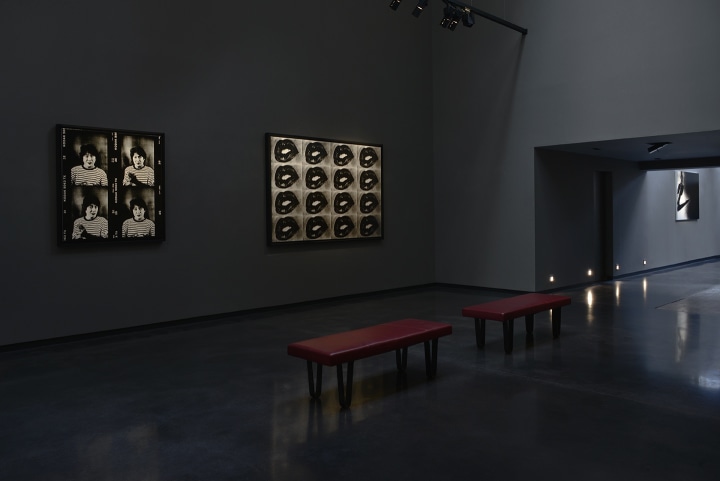Daido Moriyama is recognised as one of Japan’s most influential photographers. Now in his 80’s, Moriyama’s oeuvre includes colour pictures, Polaroids, films, installations and most rare and importantly, silkscreens.
Made using deep black ink, the artworks are larger in scale, produced either as unique works or limited editions – a complete reversal to his uneditioned gelatin silver prints. Recognised immediately for their gritty and mysterious style, the artworks pay tribute to the multiple aspects of his oeuvre from his initial projects made in Tokyo in the ’60s to his later influences which would push his work to contemporary, international acclaim.
This year marks 50 years since Moriyama saw Andy Warhol’s silkscreens at his inaugural exhibition at the Whitney Museum in New York in 1971. The New York times reviewed the presentation, concluding; “The plain, inescapable fact, which will give pain to his enemies, is that Andy looks better than he has ever looked before.” The same is certainly true of Moriyama’s silkscreens.
Whilst Moriyama was influenced by a variety of artists, Warhol may be the most important of these. When Moriyama first discovered Warhol’s silkscreens, he was immediately seduced by the medium’s traditional printing technique, which he found to be a natural extension of his photographic language. The method allowed for repeating images 'identically,' creating seemingly endless variations that call the very value of our cultural icons into question. Like Warhol’s, Moriyama’s work is a response to our ever-changing relationship with advertising, celebrity culture and digital media.
Unlike Warhol however, Moriyama has always been dedicated to street photography. He devotedly, obsessively takes street snaps all with a compact camera that fits in the back pocket of his jeans. In the words of writer and curator Simon Baker, “To me, Moriyama appears to be a person who walks around the city with his camera, glancing at things and people that interest him. Like a spark, he reacts in an instant to the city and to people. I don’t think he stares and composes an image, but rather passes by, glancing.”
When he walks down a busy street, he never stops shooting, often not looking in the viewfinder. As a result, his pictures have a palpable energy lacking in those of his predecessor, Warhol. In fact, Moriyama inherited this philosophy of movement from another American genius of the era, Jack Kerouac and his acclaimed novel ‘On the Road’ (1957). Throughout the 1960’s and ’70s, inspired by Kerouac’s story, Moriyama travelled globally and all through his home country on national highways recording his journey with the camera.
Some of Moriyama’s most iconic motifs are his images of street signs, which hint toward the Americanisation of Japanese culture and the increased eroticism in high-street advertising. Others are of mannequins, shop fronts, passers-by all taken in motion on his journey, like votive plaques of his movements through Tokyo and beyond. The silkscreens bring a stillness to the images through their scale and dynamic, inky surface. But the energy which drove them emanates from each momentous canvas.
The exhibition Moriyama: A Journey in Ink will be on view at Hamiltons Gallery from 8 Septempber 2021 to 30 October 2021.
Biography
Moriyama was born in 1938 in Osaka, where he studied photography before moving to Tokyo in 1961. There, having worked as an assistant to photographer and filmmaker Eikoh Hosoe, Moriyama began to produce his own collection of photographs depicting the forgotten areas and darker sides of his home. His early work captures life during and following the American occupation of Japan after World War II; in particular the effects of industrialisation and the consequential shift in urban life in which some areas were left behind the rapidly changing city.
Moriyama has exhibited globally in several solo and group exhibitions, the most notable being at the Fondation Cartier pour l’art contemporain in 2003 and again 2016, a joint retrospective with William Klein at Tate Modern, 2012 and presently an exhibition of silkscreens and photographs at Maison Européenne de la Photographie (MEP) ending in October 2021. Moriyama has also published multiple photo-essays and photobooks. He is held in a number of public and private collections and has been awarded the Lifetime Achievement Award from The Photographic Society of Japan, 2004; Der Kulturpreis der Deutschen Gesellschaft fur Photographie, 2004 and Mainichi Art Award, 2003 and The Hasselblad Foundation International Award, 2019, amongst others.

